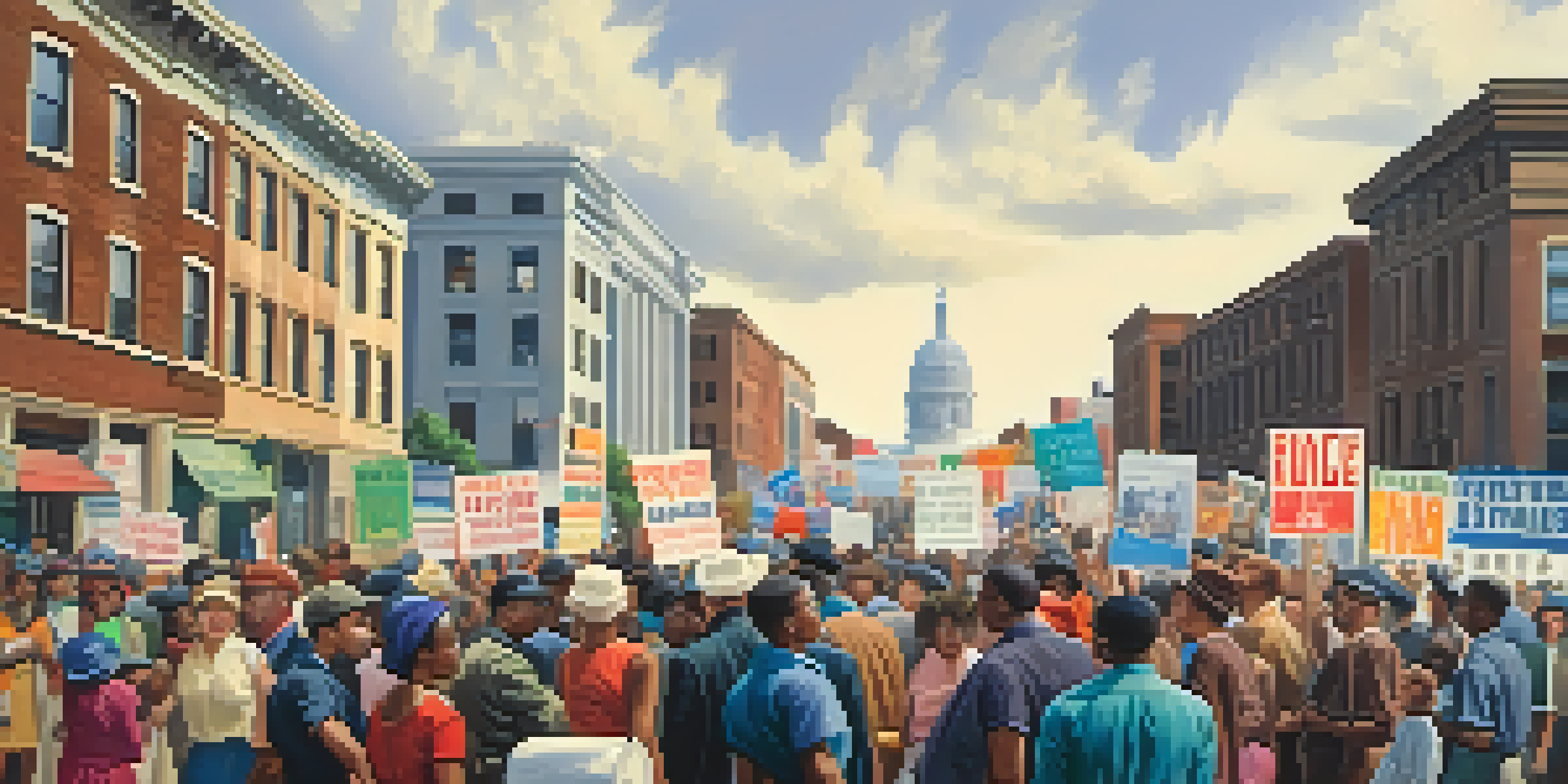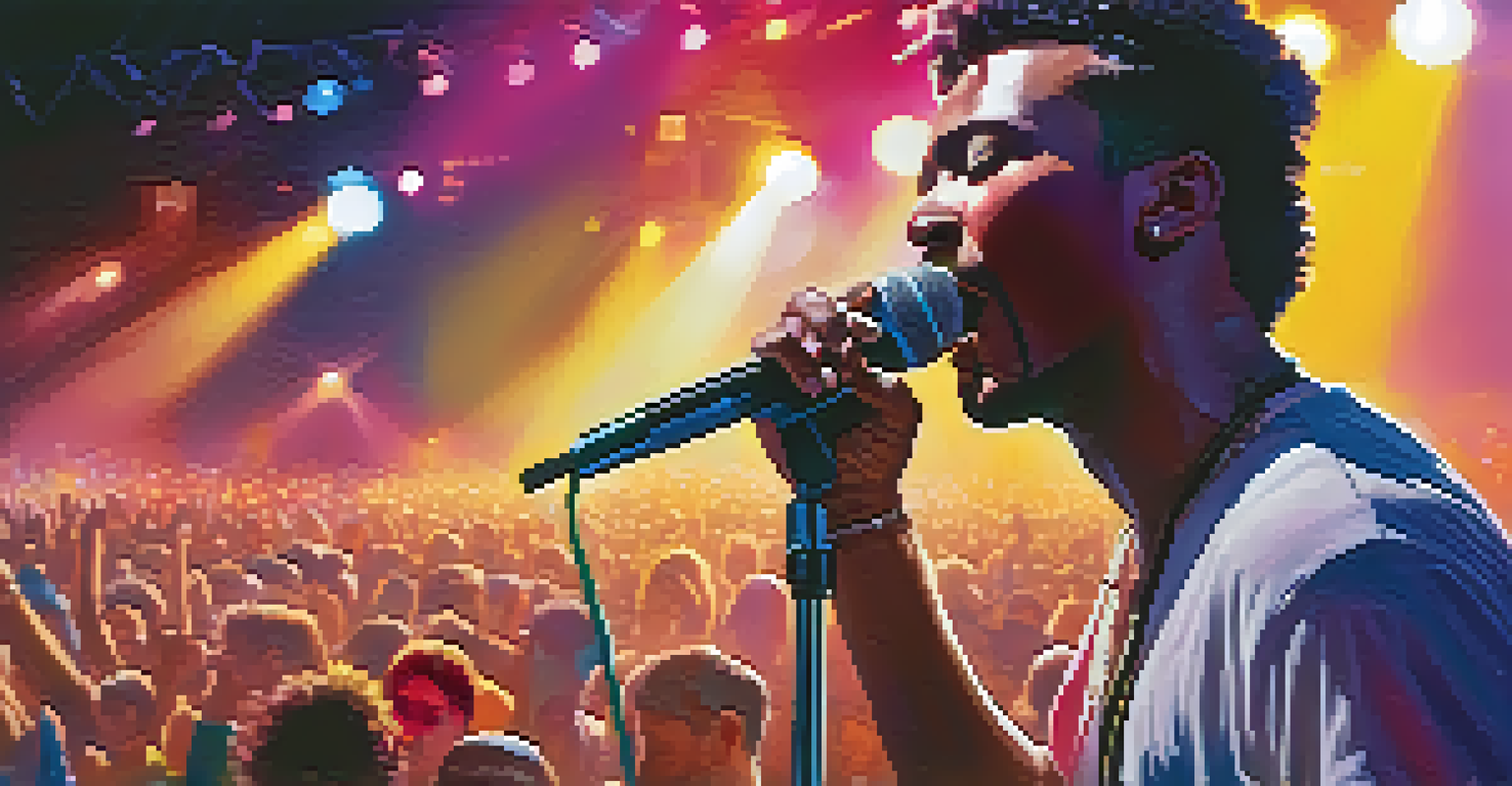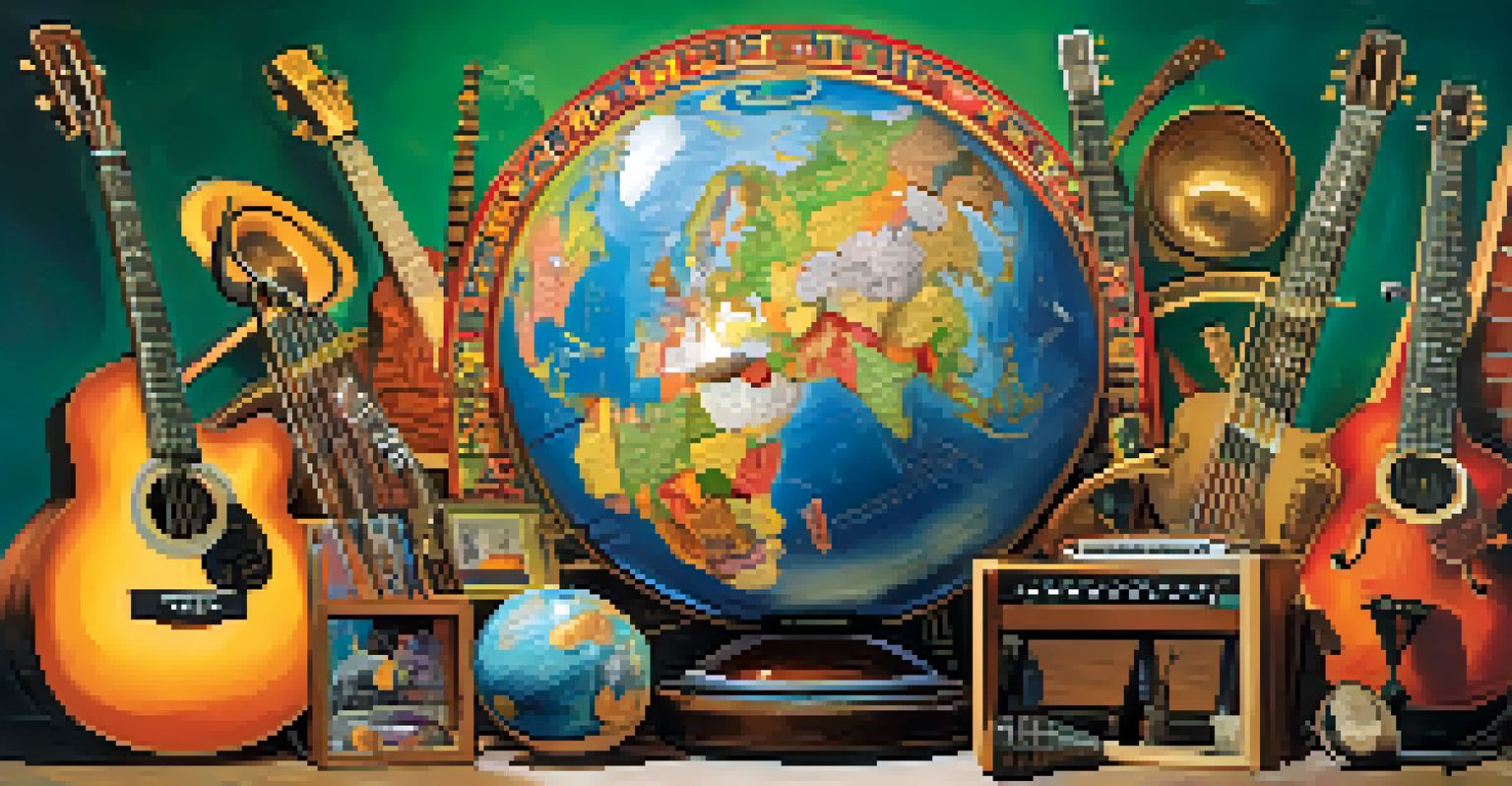The Role of Music in Social Movements and Political Change

Music as a Catalyst for Social Change
Music has often served as a powerful catalyst for social change, inspiring individuals and communities to take action. From protest songs to anthems of resistance, melodies can evoke emotions that spur listeners into mobilizing for a cause. For instance, the Civil Rights Movement of the 1960s saw songs like 'We Shall Overcome' become rallying cries that united people in their fight for equality.
Music can change the world because it can change people.
Additionally, music transcends language barriers, making it an effective tool for reaching diverse audiences. When a song resonates with a universal theme—like freedom or justice—it can create a sense of solidarity among people from various backgrounds. This shared experience fosters a collective identity that is crucial for any social movement.
Moreover, music often provides a safe space for expressing dissent and sharing stories that might otherwise go unheard. In oppressive regimes, artists use their craft to critique the status quo and inspire hope, as seen in the protest music of Latin America during the 1980s. In this way, music not only entertains but also empowers and educates.
Historical Examples of Music in Movements
Throughout history, numerous movements have harnessed the power of music to amplify their messages. For example, the anti-Vietnam War protests in the 1960s were significantly influenced by artists like Bob Dylan and Joan Baez, whose songs captured the discontent and urgency of the times. Their music played a crucial role in mobilizing the youth and spreading anti-war sentiments across the nation.

Similarly, in South Africa, the struggle against apartheid was accompanied by powerful songs that conveyed the pain and resilience of the oppressed. Songs like 'Nkosi Sikelel' iAfrika became anthems of hope, fostering unity among diverse ethnic groups fighting for liberation. The emotional weight of these songs helped galvanize support both locally and internationally.
Music Fuels Social Movements
Throughout history, music has united individuals and communities, providing a powerful voice for social change.
These historical examples illustrate how music can serve as both a mirror and a megaphone for societal issues. It not only reflects the sentiments of the people but also amplifies their voices, making it an indispensable part of the narrative in any significant social movement.
The Emotional Power of Music in Activism
One of the most compelling aspects of music is its ability to evoke deep emotions, which can drive people to action. A poignant melody or powerful lyrics can stir feelings of anger, sadness, or hope, compelling listeners to engage with the issues at hand. This emotional connection is often what propels individuals to join movements and fight for change.
The power of music makes all the difference in the world.
For instance, the haunting melodies of protest songs can remind us of the struggles faced by marginalized communities, fostering empathy and understanding. When people feel emotionally invested in a cause, they are more likely to take part in demonstrations, share information, or contribute resources to support the movement.
Additionally, music can create a sense of belonging and community among activists. Singing together at rallies or concerts can strengthen bonds, making individuals feel part of something larger than themselves. This sense of unity is vital for sustaining long-term efforts in activism, as it encourages persistence in the face of adversity.
Modern Music and Contemporary Movements
In today's digital age, music continues to play a crucial role in contemporary social movements. Artists leverage platforms like social media to share their messages and reach a global audience. Songs addressing issues like climate change, racial justice, and gender equality are gaining traction, inspiring listeners to advocate for change.
For example, the Black Lives Matter movement has seen a surge in music that addresses systemic racism and police brutality. Artists like Kendrick Lamar and Beyoncé have created songs that not only entertain but also educate and mobilize their fans to take action. This highlights how modern music serves as a powerful tool for raising awareness and driving social change.
Lyrics Drive Political Awareness
Thought-provoking lyrics challenge societal norms and inspire listeners to engage with pressing issues.
Moreover, music festivals and concerts have transformed into platforms for activism, where artists use their performances to promote causes. Events like Coachella and Glastonbury often include discussions about social issues, and artists frequently donate proceeds to charities. This fusion of entertainment and activism ensures that important messages reach a wider audience.
The Role of Lyrics in Political Messaging
Lyrics are a vital component of music that can convey powerful political messages. Thoughtful, impactful lyrics can challenge societal norms and provoke critical thinking about pressing issues. For instance, songs that address inequality or corruption can spark conversations and encourage listeners to question the status quo.
Take 'Fight the Power' by Public Enemy as an example; its explicit lyrics confront racial injustice and encourage resistance against systemic oppression. Such songs resonate with listeners who may feel disenfranchised, inspiring them to act and demand change. The potency of lyrics lies in their ability to articulate frustrations that many people feel but may struggle to express.
Furthermore, the repetition of key phrases in songs can reinforce messages, making them more memorable and effective. When listeners sing along to a catchy chorus, they are not just enjoying music; they are also internalizing the message behind it. This combination of enjoyment and engagement can lead to greater awareness and activism.
Global Perspectives: Music Across Cultures
Music's role in social movements is not limited to any one culture or region; it has been a global phenomenon. In various parts of the world, music has played a pivotal role in articulating collective grievances and aspirations. For example, in Brazil, samba and bossa nova music have been used to resist dictatorship and promote social justice, showcasing the diverse ways music can inspire change.
In the Middle East, artists have employed music as a form of protest against authoritarian regimes, as seen during the Arab Spring. Songs that capture the spirit of revolution resonate deeply with those yearning for freedom, fostering solidarity among protestors. This illustrates how music can adapt to different cultural contexts while still serving as a vehicle for activism.
Global Impact of Music on Activism
Music transcends cultural boundaries, fostering solidarity and collective action in diverse social movements worldwide.
Moreover, global collaborations among artists can amplify messages and create a sense of collective action. When musicians from different backgrounds come together to address a common cause—like climate change or human rights—they create a powerful, unified front. This cross-cultural exchange enriches the movement and highlights the universal nature of music as a tool for social change.
The Future of Music in Activism
As we look to the future, the role of music in activism is likely to evolve alongside societal changes and technological advancements. With the rise of streaming platforms and social media, artists have unprecedented access to audiences, allowing them to spread their messages far and wide. This democratization of music means that anyone with a message can potentially reach millions, further amplifying the impact of their activism.
Moreover, as new genres and styles emerge, artists will continue to find innovative ways to address social issues. Genres like hip-hop, reggaeton, and indie music are already blending political messages with entertainment, appealing to younger audiences. This evolution is crucial for keeping activism relevant and engaging to a new generation of listeners.

Ultimately, the future of music in activism hinges on its ability to adapt and resonate with current events. As long as there are injustices to address, music will remain a powerful tool for change, reminding us of the struggles we face and the hope that drives us forward.